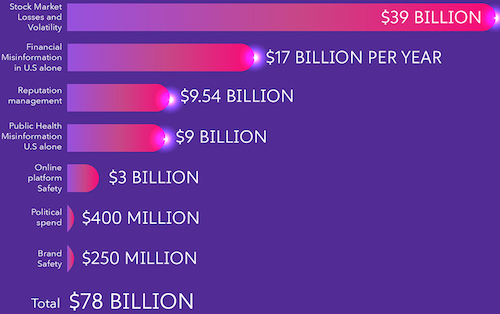Fake news articles spread over the Internet now account for an economic loss of about $78 billion a year, according to new research conducted by a University of Baltimore economist and AI and cybersecurity company CHEQ.
The CHEQ report, “The Economic Cost of Bad Actors on the Internet,” commissioned University of Baltimore economist Professor Roberto Cavazos to analyze economic data across a variety sectors in an effort to determine both the direct and indirect annual monetary damage caused by websites that propagate false information.
The findings suggest that fake news has resulted in annual stock market losses to the tune of about $39 billion. Consumers additionally lose about $17 billion a year due to misinformation that influenced their financial decisions, according to the study.
Companies that are the subject of targeted misinformation spend about $9.5 billion a year in reputation management fees and assorted resources in an attempt to defend their reputations, and misinformation in the health world costs about $9 billion each year (the anti-vaxxer movement drives most of that cost, as does fake news surrounding climate change).
 The annual global cost of the fake news crisis. The annual global cost of the fake news crisis. |
The study also found that businesses will lose about $3 billion each year from online platform safety efforts, and brands lose about $250 million annually from unwittingly running ads alongside fake news content that undermines their messages.
Altogether, the study concludes these losses amount to a global total of about $78 billion.
“So long as the ad market incentivizes the production and fake news and it remains human nature to be reactive to news, then the global economy will continue to be at severe risk of harm,” the study’s authors concludes. “The disincentives to reform point to sustained economic losses for some time.”
Political races are also dramatically affected by fake news. About $400 million are spent on fake political advertisements each year, with “at least $200 million” expected to be spent on fake news in the upcoming 2020 U.S. presidential election, according to the study.
The study’s authors also noted their estimates are “conservative” and reflect only basic direct costs, as “the true cost” of fake news “extends well beyond media expenditures.”


 There’s a fine line between newsjacking and taking advantage, aka ambulance chasing. Our job as PR professionals is to tread it carefully.
There’s a fine line between newsjacking and taking advantage, aka ambulance chasing. Our job as PR professionals is to tread it carefully. PR firms need to be mindful of ways their work product may be protected by the attorney-client privilege whenever working with a client’s internal legal team or its external legal counsel.
PR firms need to be mindful of ways their work product may be protected by the attorney-client privilege whenever working with a client’s internal legal team or its external legal counsel. Manuel Rocha, former US ambassador and intenational business advisor to LLYC, plans to plead guilty to charges that he was a secret agent for Cuba.
Manuel Rocha, former US ambassador and intenational business advisor to LLYC, plans to plead guilty to charges that he was a secret agent for Cuba. CEO mentoring is an often-overlooked aspect of why CEOs are able to make good decisions, and sometimes make bad ones—all of which intersects with the role and duties of a board.
CEO mentoring is an often-overlooked aspect of why CEOs are able to make good decisions, and sometimes make bad ones—all of which intersects with the role and duties of a board.  How organizations can anticipate, prepare and respond to crises in an increasingly complex world where a convergent landscape of global challenges, threats and risks seem to arrive at an unrelenting pace.
How organizations can anticipate, prepare and respond to crises in an increasingly complex world where a convergent landscape of global challenges, threats and risks seem to arrive at an unrelenting pace.


 Have a comment? Send it to
Have a comment? Send it to 
No comments have been submitted for this story yet.